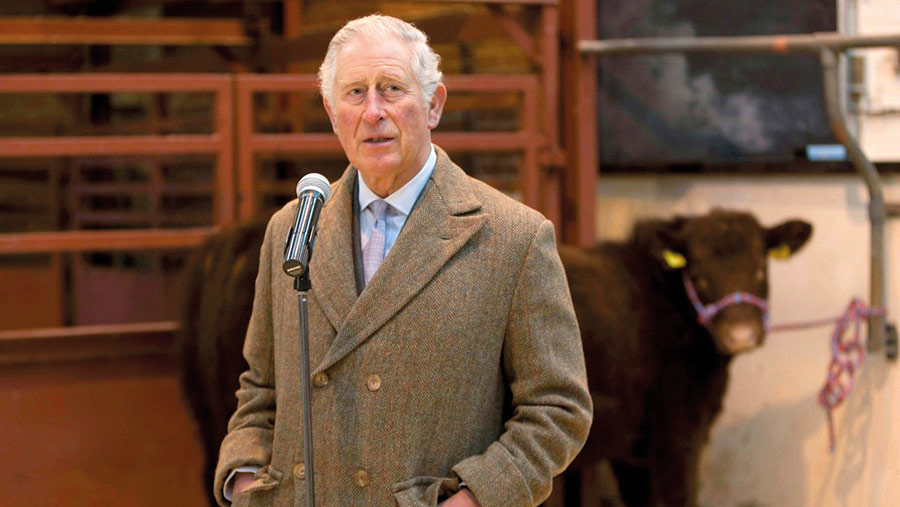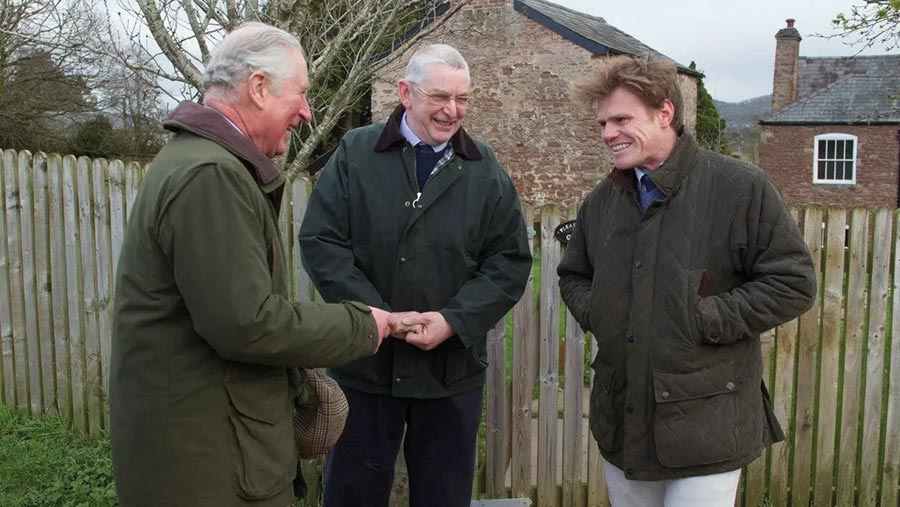Charles III: Advocate of traditional family farming and King
 © PCF
© PCF Many in the industry are unaware of the depth and breadth of King Charles III’s long-standing interest in British farming.
An advocate for the traditional family farmer, the king has invested the best part of the past 50 years into bringing about improvement to the lives of those on farms and within rural communities.
Though once ridiculed for his open support of organic farming, he has championed a renaissance in regenerative agriculture and has proved steadfast in his passion for conserving native rare breeds.
Ahead of the king’s coronation, farmers from across the country have shared their stories of meeting the new monarch and his love of the British countryside.
See also: Regenerative farming is the future, says Prince Charles
Putting the countryside back on the map
As the former private secretary to Charles III, Elizabeth Buchanan has had the privilege of working alongside the king on many projects, spanning many years.
As a farmer herself from Sussex, Elizabeth knows better than most the extent of the king’s interest and devotion to British farming.
“He is a countryman down to his bootstraps, and he would happily be a farmer in another life,” said Elizabeth.
“He is passionate about the countryside and about the people that make it as beautiful as it is. He knows these people, and has spent his life with them.
“He is never happier than when he is sat in a farmhouse kitchen with a cup of tea and a farming family.”
Elizabeth says that one of the greatest manifestations of Charles III’s care for rural families is the Prince’s Countryside Fund.
Established in 2010, the organisation’s conception was heavily influenced by the fallout from foot-and-mouth disease a few years earlier.
“His capacity to care is limitless,” said Elizabeth. “When foot-and-mouth broke out, it was absolutely horrendous, and the whole countryside was locked down.
“He said to me: ‘As soon as we can go to the countryside, get me out there to where these farmers are’.”
She recounts travelling with the king to visit a hill farm in Cumbria, which also operated a bed and breakfast, where he met with a group of local farmers who shared their devastation as a result of the disease.
After listening, the then Prince of Wales approached the farmer that owned the B&B, asking if he could come and stay. Elizabeth said: “He told me that he needed to come back and stay here, to show that the countryside is open for business.
“Tourism had come to a complete stop because all that people had seen on television was burning piles of dead animals in the countryside for half a year.
He returned and stayed for two nights. He said: ‘Let’s do it in February, so it’s in time for half term, so that people know they can come back to the countryside’,” Elizabeth recounted.
“He went back and stayed with the Relph family on their farm every year for 13 years. He still sees them now, even though they have retired from the farm. That is the mark of the man.”
A farming godfather
Herefordshire Duchy farmer Ally Hunter Blair first met the king when he took over the daily running of the farm from his parents.
“I was the youngest Duchy farming tenant when I took over at 25. He came to the farm to meet me, which was the most terrifying experience of my entire life.
“I had just moved into the farmhouse, and had mis-matched sofas – it was a typical 25-year-old’s house,” said Ally.

© AHB
“He has this amazing ability to put you at ease within a split second; you feel like you’re talking to an uncle or a godfather.”
Struck by the king’s interest in the farm, Ally recounts that the then Prince of Wales took great interest in a hedge that had just been laid, mentioning the importance of preserving the traditional skill.
“He is so enthused by farming, and just seems to be at his happiest when he is on a farm, with no cameras and no press and no pressures.
“I think he genuinely loves it – you won’t find a higher profile farming ambassador that is more positive for the industry.
“On farm is where he absolutely thrives. I think he’s going to really miss the Duchy now that he’s handed over to Prince William.”
A countryman
Farming just outside of Taunton, Justin Adams is also a Duchy farmer. His family history as Duchy tenants on the same farm can be traced back to the 1860s.
“That’s quite typical of the Duchy,” said Justin. “Where families want to carry it on, they do encourage that.”
Justin has met King Charles III on several occasions, including twice on visits to his farm. “He knows a lot about the happenings on farms generally, as well as specifically within the Duchy estate,” he said.
“Farming is obviously something that is very close to his heart. I would hazard a guess that if he hadn’t been born in the position that he was, that he would end up going farming. It comes across that this is where his heart is – he is a countryman,” Justin said.
A conservationist
Farmer and Rare Breeds Survival Trust (RBST) member Dameon Layt met Charles III at the Royal Norfolk Show in 2016, where he says the king’s passion for rare breed livestock was immediately apparent.
“He came into the rare breeds tent and spoke to every one of us; he took a personal interest,” said Mr Layt.
“He was very knowledgeable and asked what animals I kept. When I said Norfolk Horn sheep, he immediately pointed to one in the tent and said: ‘Like that one there!’.
“He knew that the Norfolk horn was part of the original breeding for the Suffolk sheep – he really knew his stuff, but it wasn’t just a matter of turning up and going through the motions, you could tell he was genuinely interested and wanted to be there,” said Dameon.
A patron of the RSBT for more than 30 years, the king keeps a herd of rare Whitebred Shorthorn cattle at Home Farm, part of the Duchy estate in Gloucestershire.
“Rare breeds are a huge passion of his,” said Dameon. “I think he’s absolutely incredible, and has done some really good work over the years.”
The Prince’s Countryside Fund
One of the King’s greatest achievements, the Prince’s Countryside Fund (PCF) was established to help farmers and rural communities to overcome some of the many challenges they face.
The organisation offers varied support for farmers, be it farm resilience programmes, business skills training, advice for new entrants, or emergency grants.
PCF executive director Keith Halstead said: “All of these aspects of our work wouldn’t have happened without his majesty forming the Prince’s Countryside Fund. He founded it, he’s not just our patron.
“It is his drive and understanding of the countryside and the people that care for it that has made it possible.”

